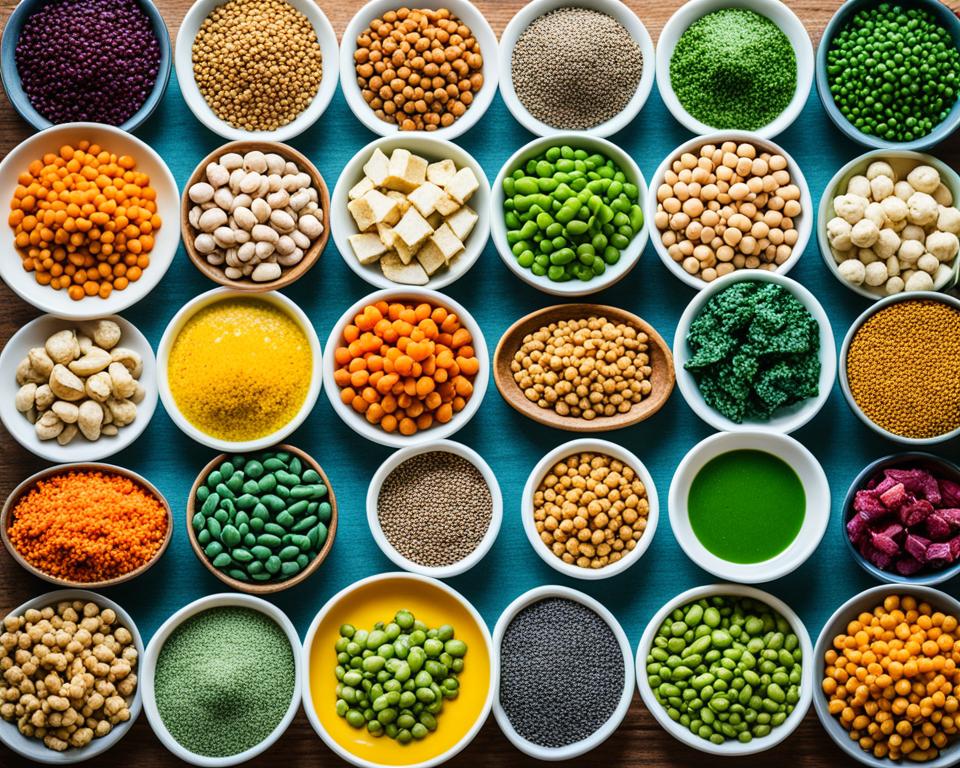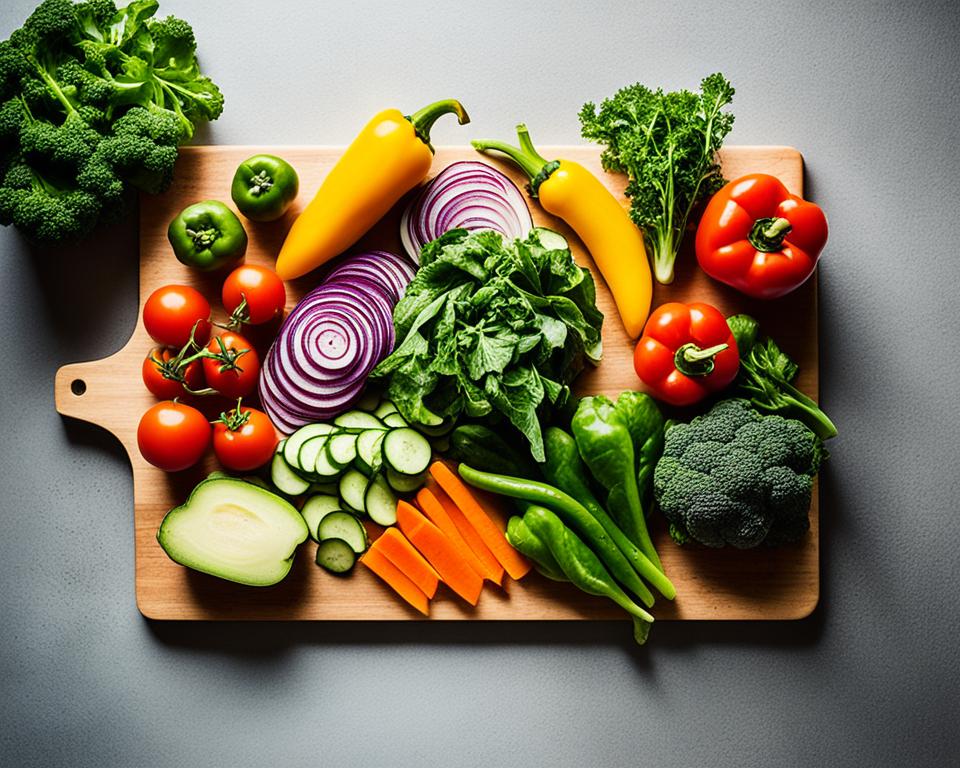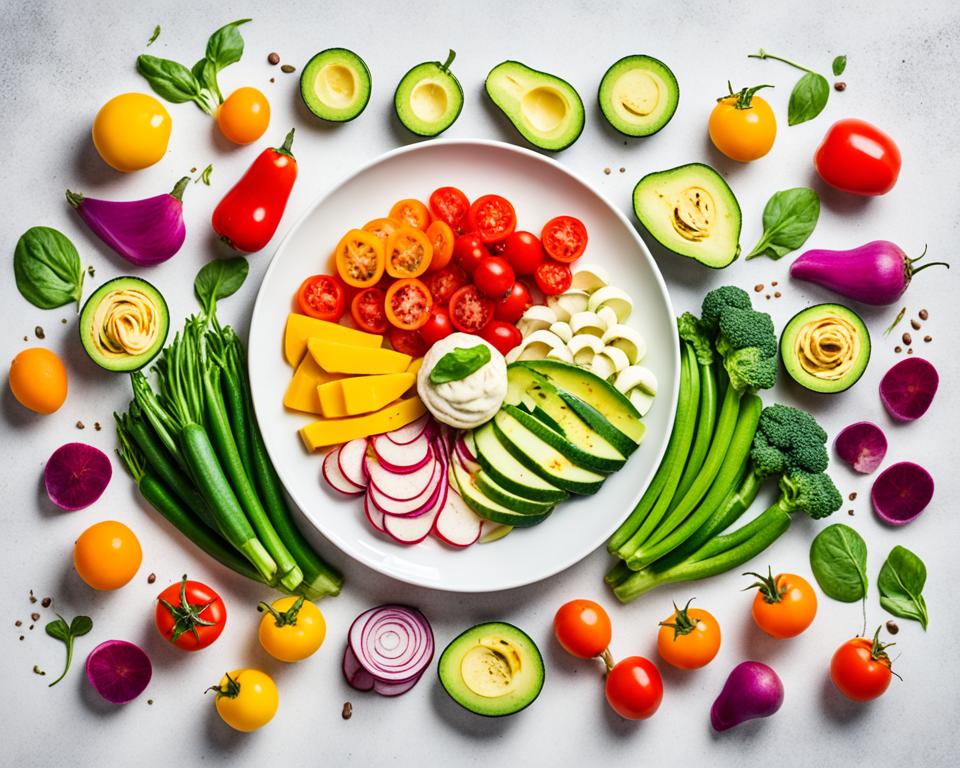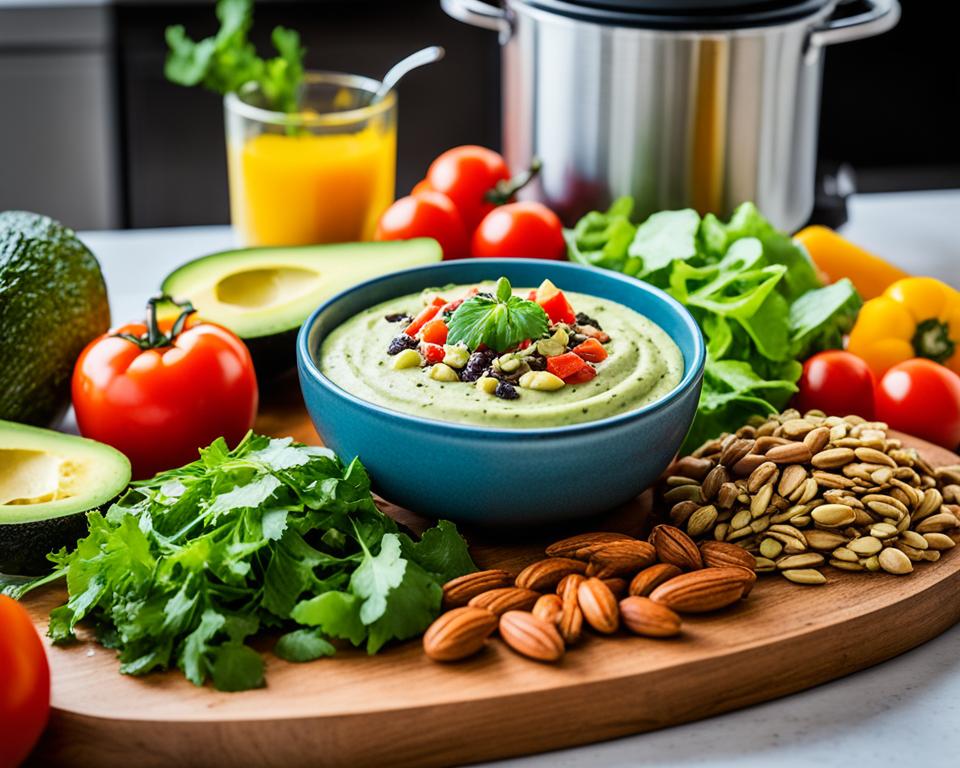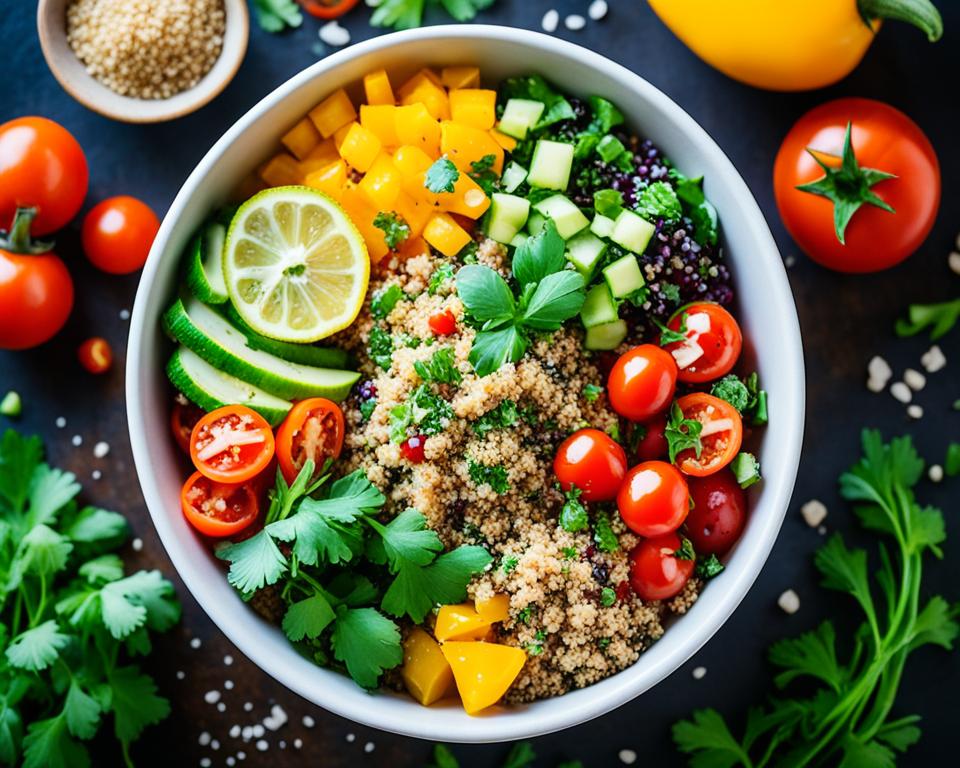Eating vegan or vegetarian is becoming a more common dietary choice, and that means more and more people have questions about getting enough nutrients—like protein—in their plant-based diet. It’s easy to meet your daily protein requirements as a vegan by balancing your meals with a variety of protein-rich vegan foods.
Key Takeaways:
- Vegan protein sources are essential for meeting protein goals on a plant-based diet.
- Plant-based protein options include soy-based products, nutritional yeast, whole grains, green vegetables, sprouted grain bread, and legumes.
- Considering vegan protein options like protein powders, recipes, and shakes can help diversify your protein intake.
- A high protein vegan diet can be achieved with proper planning and balanced meal choices.
- Athletes can also find suitable vegan protein sources to support their training and performance.
Tips for Meeting Protein Goals on a Vegan Diet
To ensure you’re meeting your protein goals on a vegan diet, it’s important to track your protein intake and make adjustments if necessary. Adequate protein consumption is key to maintain a well-balanced and healthy vegan lifestyle. Here are some tips to help you meet your protein requirements:
Track Protein Intake Daily
To accurately monitor your protein intake, use food tracking apps like Cronometer or MyFitnessPal. These apps allow you to record your regular diet and track the amount of protein you consume. By keeping track of your protein intake, you can identify any deficiencies and make adjustments accordingly.
Set Realistic Protein Goals
It’s essential to set realistic protein goals based on your individual needs and activity levels. The 2020-2025 Dietary Guidelines for Americans recommend that protein should contribute to 10%-35% of your total calorie intake. Consulting with a registered dietitian can help you determine the right protein goals for your specific needs.
Include a Variety of Vegan Protein Sources
One of the keys to meeting your protein requirements on a vegan diet is to incorporate a variety of protein-rich sources. This ensures that you receive all the essential amino acids necessary for proper bodily function. Some excellent vegan protein sources include:
- Legumes (beans, lentils, chickpeas)
- Soy-based products (tofu, tempeh, edamame)
- Nutritional yeast
- Quinoa and other whole grains
- Green vegetables (spinach, peas, Brussels sprouts)
Eating a diverse range of these protein sources allows you to obtain different types of amino acids, contributing to a balanced protein intake.
Utilize Vegan Protein Powders
Vegan protein powders can be a convenient way to boost your protein intake, especially for those with higher protein requirements or active lifestyles. There are various options available, such as pea protein, rice protein, and hemp protein. These powders can be mixed into smoothies, baked goods, or even used to create homemade protein bars.
Plan Your Meals Strategically
Planning your meals in advance can help ensure that you meet your protein goals consistently. Incorporate protein-rich foods into each meal and snack throughout the day. For example, you can enjoy a tofu scramble for breakfast, a lentil-based soup for lunch, a quinoa salad for dinner, and a handful of nuts or seeds as a snack.
Consider Protein Timing
Timing your protein intake can also be beneficial. Distributing your protein consumption evenly throughout the day ensures a steady supply of amino acids for muscle recovery and growth. Aim to include protein-rich foods in each meal and snack to optimize absorption and utilization.
“Meeting your protein goals on a vegan diet is attainable with mindful planning and proper food choices. By tracking your protein intake and incorporating a variety of vegan protein sources into your meals, you can maintain a well-nourished and healthy vegan lifestyle.”
To visualize the protein content of various vegan foods, refer to the table below:
| Food | Protein Content per Serving |
|---|---|
| Tofu (1/2 cup) | 10g |
| Lentils (1 cup) | 18g |
| Quinoa (1 cup) | 8g |
| Chickpeas (1 cup) | 14.5g |
By incorporating these tips into your vegan diet, you can ensure that you’re meeting your protein goals and enjoying a well-rounded and nourishing plant-based lifestyle.
Soy-Based Protein Sources for Vegans
Soy-based protein sources like tofu, tempeh, edamame, and soy milk are excellent options for adding protein to a vegan diet. Not only are they rich in protein, but they also offer various health benefits such as cardiovascular health and hormone balance.
When it comes to soy-based proteins, there are several delicious and versatile options to choose from:
- Tofu: This popular soy-based protein is made from condensed soy milk. It has a mild flavor and a firm texture, making it a versatile ingredient in various dishes. Tofu contains approximately 9g of protein per 3 ounces.
- Tempeh: Tempeh is a fermented soybean product with a nutty flavor and a firm texture. It’s a great meat alternative in dishes like stir-fries, sandwiches, and salads. A 1/2 cup of tempeh provides about 17g of protein.
- Edamame: These young soybeans are typically served in their pods, either boiled or steamed. They make a tasty and nutritious snack or can be added to salads, soups, and stir-fries. Shelled edamame offers approximately 9g of protein per 1/2 cup.
- Soy Milk: This dairy-free milk alternative is made from soybeans and offers a creamy texture and subtle flavor. It can be used as a beverage on its own, poured over cereal, or added to smoothies. One cup of soy milk provides around 7g of protein.
Adding soy-based protein sources to your vegan diet not only helps meet your protein needs but also provides essential nutrients. So go ahead and incorporate these delicious options into your meals to enjoy a protein-packed and plant-based lifestyle.
Nutritional Yeast as a Vegan Protein Source
Nutritional yeast is a versatile and delicious vegan protein source that is gaining popularity among plant-based eaters. Not only does it provide a unique cheesy and umami flavor to dishes, but it also offers numerous nutritional benefits. One of the standout features of nutritional yeast is its high protein content, making it an excellent addition to a vegan diet.
One of the key advantages of nutritional yeast is its rich vitamin B12 content. Vitamin B12 is essential for vegans as it is predominantly found in animal-based foods. By incorporating nutritional yeast into their meals, vegans can ensure they are meeting their vitamin B12 requirements, which is crucial for maintaining energy levels and supporting nerve function.
When it comes to protein, nutritional yeast doesn’t disappoint. According to the USDA, just two tablespoons of nutritional yeast provide approximately 4g of protein. This makes it a convenient and efficient way for vegans to boost their protein intake without relying solely on traditional protein sources.
Another remarkable aspect of nutritional yeast is its versatility. It can be used in various recipes to add depth of flavor and a nutritional boost. Sprinkle it over popcorn, pasta, or salads for a savory touch, or incorporate it into sauces, dressings, and vegan cheese alternatives for a creamy texture and a hint of umami.
To fully grasp the protein and nutritional benefits of nutritional yeast, take a look at the table below:
| Nutritional Yeast | Protein per 2 tablespoons (approx.) |
|---|---|
| Nutritional Yeast | 4g |
As you can see, nutritional yeast packs a protein punch and can contribute significantly to the overall protein intake of a vegan diet. Including this flavorful ingredient in your meals not only adds a savory touch but also ensures you’re getting the necessary nutrients on a plant-based diet.
With its unique flavor profile, protein content, and vitamin B12 richness, nutritional yeast is truly a powerhouse ingredient for vegans seeking plant-based protein options. Whether you’re looking to enhance the taste of your dishes or boost your protein intake, nutritional yeast is a must-have pantry staple for all plant-based enthusiasts.
Seitan as a Protein-Rich Vegan Option
Seitan is a popular protein-rich vegan alternative that offers a texture and taste closely resembling meat. Made from vital wheat gluten, seitan provides a substantial amount of protein in plant-based diets. Although it is not suitable for those with gluten sensitivities or allergies, seitan offers 20g of protein per 3 ounces, according to the USDA.
Seitan’s versatility makes it an excellent choice for various dishes, allowing vegans to enjoy hearty and satisfying meals. Its high protein content makes it a favorite among athletes and individuals following a high protein vegan diet.
Incorporating seitan into your recipes can help enhance the nutritional value of your meals while providing a flavor and texture that is reminiscent of meat. Whether you’re looking for a plant-based meat alternative or exploring new vegan protein sources, seitan is a valuable addition to your kitchen.
Protein-Rich Whole Grains for Vegans
Whole grains are an excellent source of protein for vegans, providing a nutrient-dense addition to their diet. In addition to being high in complex carbohydrates and fiber, whole grains such as quinoa, wild rice, oats, and buckwheat contain significant amounts of protein.
Quinoa, a versatile and complete protein, offers 8g of protein per 1 cup. Wild rice, known for its nutty flavor and chewy texture, contains 6.5g of protein per 1 cup. Oats, a breakfast staple, provide 6g of protein per 1 cup. Lastly, buckwheat, often used in gluten-free baking, offers 5.5g of protein per 1 cup, making it an excellent choice for those following a vegan diet.
| Whole Grain | Protein Content (per 1 cup) |
|---|---|
| Quinoa | 8g |
| Wild Rice | 6.5g |
| Oats | 6g |
| Buckwheat | 5.5g |
These whole grains can be incorporated into various recipes, adding not only protein but also flavor and texture. From hearty quinoa bowls and creamy wild rice pilaf to comforting oatmeal and savory buckwheat pancakes, there are endless possibilities to enjoy these protein-rich whole grains.
Adding whole grains to a vegan diet ensures a well-rounded source of not only protein but also essential vitamins, minerals, and dietary fiber. With their versatility and nutritional benefits, quinoa, wild rice, oats, and buckwheat are staples worth incorporating into any vegan meal plan.
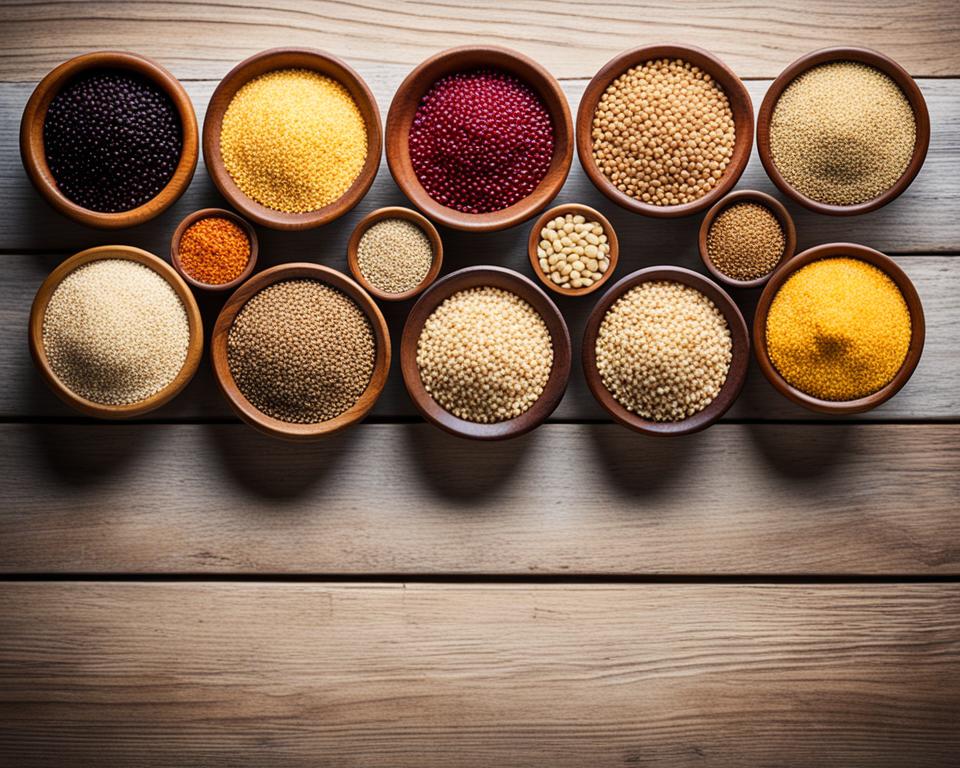
Protein in Green Vegetables for Vegans
When it comes to vegan protein sources, green vegetables may not be the first thing that comes to mind. However, spinach, green peas, and Brussels sprouts actually offer a surprising amount of protein alongside their other essential nutrients.
Spinach, for example, contains 5g of protein per cup, making it a valuable addition to any plant-based diet. Green peas provide 4g of protein per 1/2 cup, while Brussels sprouts offer 2g of protein per 1/2 cup, according to the USDA.
While these protein amounts may not rival the protein content of legumes or soy-based products, incorporating green vegetables into your meals can still contribute to your overall protein intake. Plus, they bring a variety of vitamins, minerals, and fiber to support a well-rounded vegan diet.
Benefits of Green Vegetables:
- Spinach: Rich in iron, vitamins A and C
- Green peas: High in fiber, folate, and vitamin K
- Brussels sprouts: Packed with vitamin C, vitamin K, and antioxidants
So, don’t overlook the protein potential of green vegetables. Including spinach, green peas, and Brussels sprouts in your vegan meals can add both flavor and nutrition to your plate.
| Green Vegetable | Protein Content |
|---|---|
| Spinach | 5g per cup |
| Green Peas | 4g per 1/2 cup |
| Brussels Sprouts | 2g per 1/2 cup |
Protein in Sprouted Grain Bread for Vegans
Sprouted grain bread, such as Ezekiel bread, is a nutritious and protein-rich option for vegans. Made from sprouted whole grains and legumes, this plant-based bread provides a good amount of protein while offering numerous health benefits.
Two slices of Ezekiel bread contain approximately 8g of protein, making it a valuable addition to a vegan diet. It is an ideal alternative to traditional breads, which may lack the protein content that vegans need.
What sets sprouted grain bread apart is the sprouting process. This process breaks down enzymes and releases beneficial nutrients, making the bread easier to digest and improving nutrient absorption. Sprouted grain bread is also typically made without added sugars, preservatives, or artificial ingredients, making it a healthier choice overall.
Additionally, sprouted grains are generally higher in fiber, vitamins, and minerals compared to refined grains. They are particularly rich in antioxidants, which help protect the body from oxidative stress and reduce the risk of chronic diseases.
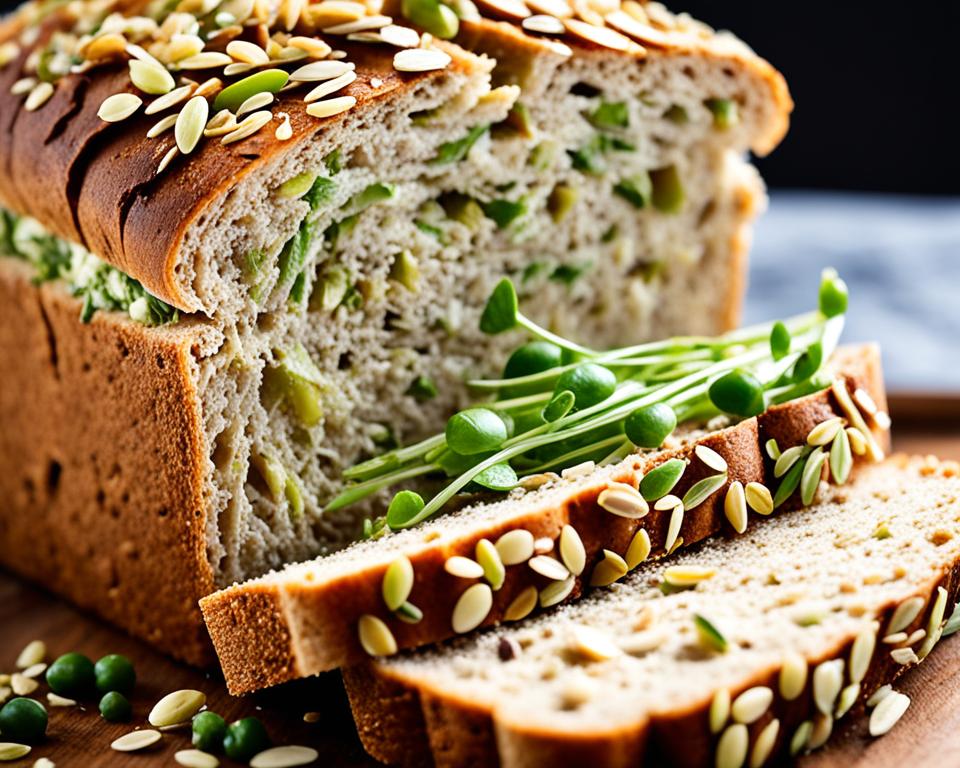
Include sprouted grain bread in your vegan diet to boost your protein intake and enjoy a more nutrient-dense option. Whether toasted or used for sandwiches, this plant-based bread will not only satisfy your taste buds but also contribute to your overall health and well-being.
Legumes as a Budget-Friendly Protein Source for Vegans
Legumes, including beans and lentils, are affordable and versatile vegan protein sources. They are rich in protein, fiber, and various nutrients. Lentils provide 18g of protein per 1 cup, chickpeas offer 14.5g of protein per 1 cup, and black beans contain 15g of protein per 1 cup, according to the USDA. Legumes are commonly used in vegan dishes like curries, stews, and salads.
By incorporating legumes into their diet, vegans can enjoy a cost-effective way to meet their protein requirements while also benefiting from the other nutrients legumes provide. Whether you prefer black beans in a hearty chili, lentils in a flavorful curry, or chickpeas in a refreshing salad, there are endless possibilities to explore.
Legumes are especially beneficial for athletes following a vegan diet. They provide the necessary protein for muscle recovery and growth, making them an excellent choice for plant-based athletes. Incorporating a variety of legumes into meals can help meet the increased protein needs of active individuals.
Benefits of Legumes for Vegan Athletes
- Rich in Protein: Legumes are a great source of plant-based protein, providing the necessary amino acids for muscle repair and growth.
- High in Fiber: Legumes are also fiber-rich, promoting satiety and aiding in digestion.
- Cost-effective: Legumes are an affordable protein source, making them ideal for athletes on a budget.
- Versatile: Legumes can be used in a variety of dishes, including soups, stews, salads, and even desserts.
Quick and Easy Vegan Recipes with Legumes
Looking for some inspiration on how to incorporate legumes into your daily meals? Here are a few easy and delicious vegan recipes:
- Vegan Black Bean Chili: A hearty and flavorful chili packed with protein-rich black beans, vegetables, and spices.
- Lentil Curry: A fragrant and satisfying curry made with protein-packed lentils, aromatic spices, and creamy coconut milk.
- Chickpea Salad: A refreshing salad featuring protein-rich chickpeas, crisp vegetables, and a zesty dressing.
- Black Bean Brownies: A healthier twist on traditional brownies, made with black beans for added protein and fiber.
Conclusion
Meeting protein goals on a vegan diet is entirely possible by incorporating a diverse range of protein-rich plant-based foods. With a variety of options, vegans can easily meet their daily protein requirements and enjoy a healthy plant-based diet.
Soy-based products like tofu, tempeh, edamame, and soy milk are excellent sources of vegan protein. Not only are they rich in protein, but they also offer additional health benefits such as cardiovascular health and hormone balance.
Other fantastic sources of vegan protein include nutritional yeast, which is not only protein-rich but also a great source of vitamin B12, a nutrient often lacking in vegan diets. Whole grains like quinoa, wild rice, oats, and buckwheat are also high in protein, along with being rich in complex carbs and fiber.
Green vegetables, such as spinach, green peas, and Brussels sprouts, although not typically associated with high protein content, contain decent amounts of protein in addition to other essential nutrients. Sprouted grain bread, like Ezekiel bread, is another great option for obtaining protein in a vegan diet.
Lastly, legumes like beans and lentils are affordable, versatile, and highly nutritious sources of vegan protein. Incorporating these plant-based protein sources into your meals with proper planning and balanced choices will ensure you meet your protein goals and experience the benefits of a high protein vegan diet.
FAQ
What are some top vegan protein sources for healthy eating?
Some top vegan protein sources include soy-based products like tofu, tempeh, and edamame, nutritional yeast, seitan, whole grains like quinoa and oats, green vegetables like spinach and Brussels sprouts, sprouted grain bread, and legumes such as beans and lentils.
How can I meet my protein goals on a vegan diet?
To meet your protein goals on a vegan diet, it’s important to track your protein intake using food tracking apps like Cronometer or MyFitnessPal. The recommended protein intake for vegans is 10%-35% of your total calorie intake, according to the 2020-2025 Dietary Guidelines for Americans. By incorporating a variety of protein-rich plant-based foods and balancing your meals, you can easily meet your protein requirements.
What are some soy-based protein sources for vegans?
Soy-based protein sources for vegans include tofu, tempeh, edamame, and soy milk. These options are not only high in protein but also offer health benefits like cardiovascular health and hormone balance.
What is nutritional yeast and how can it be used as a vegan protein source?
Nutritional yeast is a popular vegan protein source that is also rich in vitamin B12, a nutrient often lacking in vegan diets. It has a cheesy and umami flavor and can be used in various recipes as a seasoning or topping. Nutritional yeast contains around 4g of protein per 2 tablespoons.
What is seitan and how can it be incorporated into a vegan diet?
Seitan is a protein-rich vegan option made from vital wheat gluten. It closely resembles the texture and taste of meat and is often used as a plant-based meat substitute. Seitan can be used in various dishes and is a staple in many plant-based diets. It contains around 20g of protein per 3 ounces.
Which whole grains are high in protein for vegans?
Whole grains like quinoa, wild rice, oats, and buckwheat are not only high in complex carbs and fiber but also contain significant amounts of protein. For example, quinoa provides 8g of protein per 1 cup, wild rice contains 6.5g of protein per 1 cup, oats offer 6g of protein per 1 cup, and buckwheat provides 5.5g of protein per 1 cup.
Can green vegetables be a good source of protein for vegans?
While not typically associated with high protein content, green vegetables like spinach, green peas, and Brussels sprouts do offer decent amounts of protein along with other essential nutrients. Spinach contains 5g of protein per cup, green peas provide 4g of protein per 1/2 cup, and Brussels sprouts offer 2g of protein per 1/2 cup.
How can sprouted grain bread be a source of protein for vegans?
Sprouted grain bread, such as Ezekiel bread, is made from sprouted whole grains and legumes and provides a good amount of protein. Two slices of Ezekiel bread contain approximately 8g of protein. Sprouted grain bread is a nutritious and protein-rich alternative to traditional bread.
What are some budget-friendly legumes that are high in protein for vegans?
Legumes, including beans and lentils, are affordable and versatile vegan protein sources. They are rich in protein, fiber, and various nutrients. Lentils provide 18g of protein per 1 cup, chickpeas offer 14.5g of protein per 1 cup, and black beans contain 15g of protein per 1 cup.
How can vegans incorporate legumes into their diet?
Legumes can be incorporated into a vegan diet in various ways. They are commonly used in vegan dishes like curries, stews, and salads. Additionally, they can be used to make spreads like hummus or added to soups and burgers as a protein-packed ingredient.

